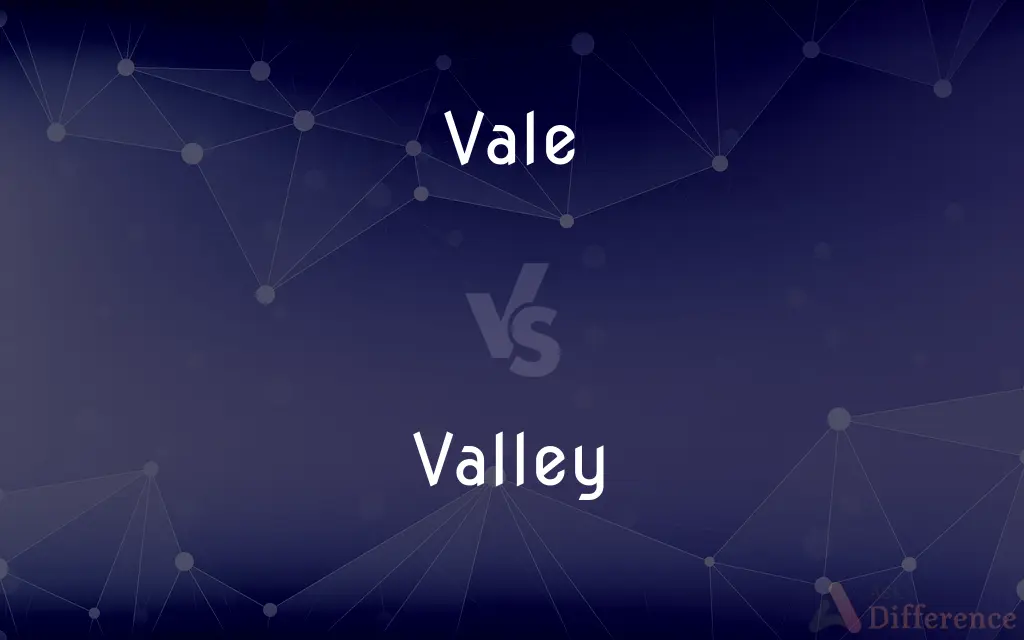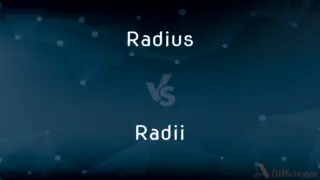Vale vs. Valley — What's the Difference?
By Tayyaba Rehman — Updated on October 19, 2023
"Vale" and "Valley" both refer to a depression or hollow between hills or mountains. While "Valley" is the common term, "Vale" is poetic or literary.

Difference Between Vale and Valley
Table of Contents
ADVERTISEMENT
Key Differences
"Vale" and "Valley" are two terms that refer to similar geographic features. A "Valley" is a well-known term that describes an elongated depression between uplands, hills, or mountains. Conversely, "Vale" carries a similar meaning but is often used in more poetic or literary contexts.
Both "Vale" and "Valley" depict landscapes where the land dips, forming a space often carved by rivers or glaciers. When you come across the word "Valley" in everyday language, it refers to such natural depressions, which may be broad or narrow, long or short. "Vale," on the other hand, has an old-world charm to it, reminiscent of classic literature or poetry.
It's crucial to recognize that the term "Valley" has found broader applications in modern times. Silicon Valley, for instance, denotes a region known for its tech influence and not necessarily for its topography. In contrast, "Vale" remains true to its original, more romantic essence, often evoking images of serene, picturesque landscapes.
In summary, while "Vale" and "Valley" can technically be used interchangeably, their connotations vary. "Valley" is versatile, fitting into everyday conversation and technical descriptions, whereas "Vale" has a lyrical, more emotive quality to it.
Comparison Chart
Definition
A valley, especially a poetic one
An elongated depression between uplands or hills
ADVERTISEMENT
Usage
Literary or poetic contexts
Common everyday usage
Connotation
Romantic, old-world
Neutral, descriptive
Examples in Modern Times
Rare, mostly in literature
Common, e.g., Silicon Valley
Flexibility
Limited to specific contexts
Broad, used in various contexts
Compare with Definitions
Vale
A tract of low ground or a depression.
The peaceful vale was bathed in moonlight.
Valley
An elongated depression between hills or mountains.
The river flowed through the wide valley.
Vale
Used in poetic or literary contexts for "valley".
The poet described a tranquil vale.
Valley
A low area of land between higher areas.
Houses were built at the base of the valley.
Vale
A space between hills.
Birds soared above the secluded vale.
Valley
A region characterized by a particular feature or activity.
Silicon Valley is known for its tech companies.
Vale
A hollow or valley, especially a scenic one.
They wandered through the green vale.
Valley
The low point or a depression in a range.
Snow accumulated in the valley between peaks.
Vale
A dale or a valley of particular beauty or charm.
The vale sparkled with morning dew.
Valley
A groove or channel.
The valley of the roof needs repairs.
Vale
A valley (used in place names or as a poetic term)
The Vale of Glamorgan
Valley
A valley is an elongated low area often running between hills or mountains, which will typically contain a river or stream running from one end to the other. Most valleys are formed by erosion of the land surface by rivers or streams over a very long period of time.
Vale
A written or spoken farewell.
Valley
A low area of land between hills or mountains, typically with a river or stream flowing through it
The valley floor
The Thames Valley
Vale
Farewell.
Valley
An internal angle formed by the intersecting planes of a roof, or by the slope of a roof and a wall.
Vale
A valley, often coursed by a stream; a dale.
Valley
An elongated lowland between ranges of mountains, hills, or other uplands, often having a river or stream running along the bottom.
Vale
A valley.
Valley
An extensive area of land drained or irrigated by a river system.
Vale
Farewell.
Vale, Sarah Smith
Valley
A depression or hollow resembling or suggesting a valley, as the point at which the two slopes of a roof meet.
Vale
A tract of low ground, or of land between hills; a valley.
Beyond this vale of tears there is a life above.
In those fair vales, by nature formed to please.
Valley
An elongated depression cast between hills or mountains, often garnished with a river flowing through it.
Vale
See 2d Vail, 3.
Valley
An area which drains itself into a river.
Vale
A long depression in the surface of the land that usually contains a river
Valley
Any structure resembling one, e.g. the interior angle formed by the intersection of two sloping roof planes.
Valley
To form the shape of a valley.
Valley
The space inclosed between ranges of hills or mountains; the strip of land at the bottom of the depressions intersecting a country, including usually the bed of a stream, with frequently broad alluvial plains on one or both sides of the stream. Also used figuratively.
The valley of the shadow of death.
Sweet interchangeOf hill and valley, rivers, woods, and plains.
Valley
The place of meeting of two slopes of a roof, which have their plates running in different directions, and form on the plan a reëntrant angle.
Valley
A long depression in the surface of the land that usually contains a river
Common Curiosities
Can "Valley" refer to things other than geography?
Yes, e.g., Silicon Valley relates to the tech industry, not just topography.
Would I find "Vale" in modern literature?
It's less common but can be found, especially in poetic or romantic settings.
Is "Vale" an old-fashioned term?
It has an older, literary connotation, making it seem old-world.
Is "Vale" commonly used in everyday speech?
No, "Vale" is more typical in literary or poetic contexts.
Are "Vale" and "Valley" synonymous?
Yes, both refer to a depression between uplands, but "Vale" is more poetic.
Can "Vale" refer to a broad expanse?
Typically, "Vale" evokes a narrower, more picturesque space.
How are valleys important for human civilization?
They offer water, fertile land, and protection, often becoming hubs for settlements.
Does every mountain range have valleys?
Most do, as valleys are depressions or low areas between higher elevations.
What's a famous example of a valley?
The Grand Valley or Napa Valley are well-known examples.
Are valleys always formed by rivers?
Not always, valleys can be formed by glaciers, tectonic movements, and other forces.
Is "Vale" of Latin origin?
Yes, it derives from "vallis" meaning "valley" in Latin.
Would I find the term "Vale" in a geography textbook?
It's possible but less likely. "Valley" is the standard term in academic texts.
How do valleys benefit ecosystems?
Valleys often have fertile soil and water sources, supporting diverse life.
Can "Vale" be used in place of "Valley" in all contexts?
While they can technically replace each other, "Vale" is best in literary settings.
Is "Vale" ever used outside of poetic contexts?
It's rare but can be found in some traditional or region-specific usages.
Share Your Discovery

Previous Comparison
Characteristic vs. Property
Next Comparison
Radius vs. RadiiAuthor Spotlight
Written by
Tayyaba RehmanTayyaba Rehman is a distinguished writer, currently serving as a primary contributor to askdifference.com. As a researcher in semantics and etymology, Tayyaba's passion for the complexity of languages and their distinctions has found a perfect home on the platform. Tayyaba delves into the intricacies of language, distinguishing between commonly confused words and phrases, thereby providing clarity for readers worldwide.














































